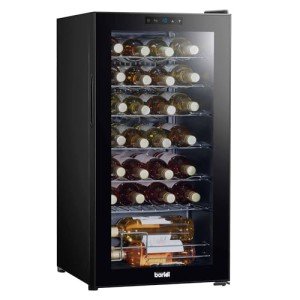12 Companies Setting The Standard In Fridge UK
The Comprehensive Guide to Refrigerators in the UK
Refrigerators are an essential home appliance in every household, serving an essential function in food conservation and security. The UK market provides a diverse variety of fridge types, sizes, functions, and brand names. This article aims to provide an in-depth understanding of fridges readily available in the UK, including their features, energy performance, and aspects to consider when making a purchase.
Kinds Of Refrigerators Available in the UK
When trying to find a refrigerator, it is essential to comprehend the various types available. Each type includes its own set of functions and functions, dealing with different requirements and choices. The most common kinds of fridges discovered in the UK include:
1. Leading Freezer Refrigerators
- Description: The traditional style, featuring the freezer compartment on top.
- Pros: More budget friendly, spacious, easy access to fresh food.
- Cons: Limited freezer area, the top might be less convenient for bulk products.
2. Bottom Freezer Refrigerators
- Description: Freezer is located at the bottom, allowing much easier access to fresh food.
- Pros: Greater benefit, better exposure of fresh products.
- Cons: Usually more expensive, some may deal with large frozen products.
3. Side-by-Side Refrigerators
- Description: Features two vertical compartments, one for the fridge and one for the freezer.
- Pros: Ample storage space, simple to access both frozen and fresh foods.
- Cons: Wider footprint, they might not fit in smaller sized kitchens.
4. French Door Refrigerators
- Description: Combines functions of bottom freezers and side-by-sides, with two doors for the fridge on top.
- Pros: Stylish design, roomy, and typically consists of innovative features.
- Cons: Higher cost point, aligns badly with smaller sized cooking area layouts.
5. Compact Refrigerators
- Description: Smaller designs designed for restricted areas.
- Pros: Ideal for small apartments or offices, energy-efficient.
- Cons: Limited storage capability, might lack functions.
6. Integrated Refrigerators
- Description: Designed to blend effortlessly with cooking area cabinetry.
- Pros: Custom fit, aesthetic appeal, increases home worth.
- Cons: Higher cost, may provide less versatility in positioning.
7. Smart Refrigerators
- Description: Equipped with Wi-Fi and wise technology features.
- Pros: Advanced includes like touch screens and internal electronic cameras.
- Cons: Expensive, more complex to fix.
Refrigerator Type
Accessibility
Average Price Range
Energy Efficiency
Leading Freezer
Moderate
₤ 300 – ₤ 600
Average
Bottom Freezer
High
₤ 400 – ₤ 800
Above Average
Side-by-Side
Easy
₤ 800 – ₤ 1500
Varies
French Door
High
₤ 800 – ₤ 2000
High
Compact
Limited
₤ 200 – ₤ 500
Average
Integrated
Customized
₤ 1000 – ₤ 2500
High
Smart
Variable
₤ 1200+
High
Secret Features to Consider
- Energy Efficiency: Look for models that are energy-efficient. In the UK, home appliances are rated from A (most efficient) to G (least efficient). An A+ rating and above can lead to significant energy cost savings.
- Capability: Choose a fridge with enough capacity for your household. Cheap Fridges Freezers is 100-200 liters per person.
- Noise Level: Consider designs that run silently, especially if the cooking area is near living areas.
- Cooling Technology: Features like frost-free technology are worth the financial investment, as they reduce maintenance.
- Adjustable Shelves: Having adjustable shelves boosts the versatility to keep bigger products.
- Temperature Control: Check for user friendly temperature level controls and zones for various kinds of food.
- Style: Choose the style and color that matches your cooking area aesthetic, whether you prefer a modern-day stainless steel look or a timeless retro surface.
Buying Tips
- Determine Your Needs: Consider your cooking habits, household size, and kitchen space.
- Set a Budget: Refrigerators can be found in various cost varieties. Establish a spending plan before you begin going shopping.
- Research Study Energy Ratings: Invest in energy-efficient models to save money on utility expenses.
- Read Reviews: User experiences can provide insights into dependability and efficiency.
- Compare Brands: Some brand names are understood for their resilience while others might offer more ingenious functions.
Often Asked Questions (FAQs)
1. How long do fridges generally last?
- Refrigerators typically last in between 10 to 20 years, depending upon the brand name and how well they are preserved.
2. Are there any maintenance tips for extending the life of a refrigerator?
- Regularly tidy the coils, inspect the door seals, and occasionally thaw if essential to preserve optimal performance.
3. What is the very best size refrigerator for a family of four?
- For a household of four, a refrigerator with a capability of around 400-600 liters is normally enough.
4. Do I need to fret about energy usage when purchasing a refrigerator?
- Yes, energy usage is essential. Look for systems with high energy efficiency rankings to decrease monthly expenses.
5. Should I select a fridge with a water and ice dispenser?
- This feature can be hassle-free, specifically for families. However, it may require more upkeep than basic models.
Acquiring a refrigerator is a considerable decision for any household in the UK. With various types offered, each with its special functions and advantages, it is important to examine individual needs before making a choice. By considering aspects such as energy performance, capability, and style looks, consumers can select a fridge that lines up well with their way of life, eventually boosting their kitchen area experience while protecting food quality and freshness.
